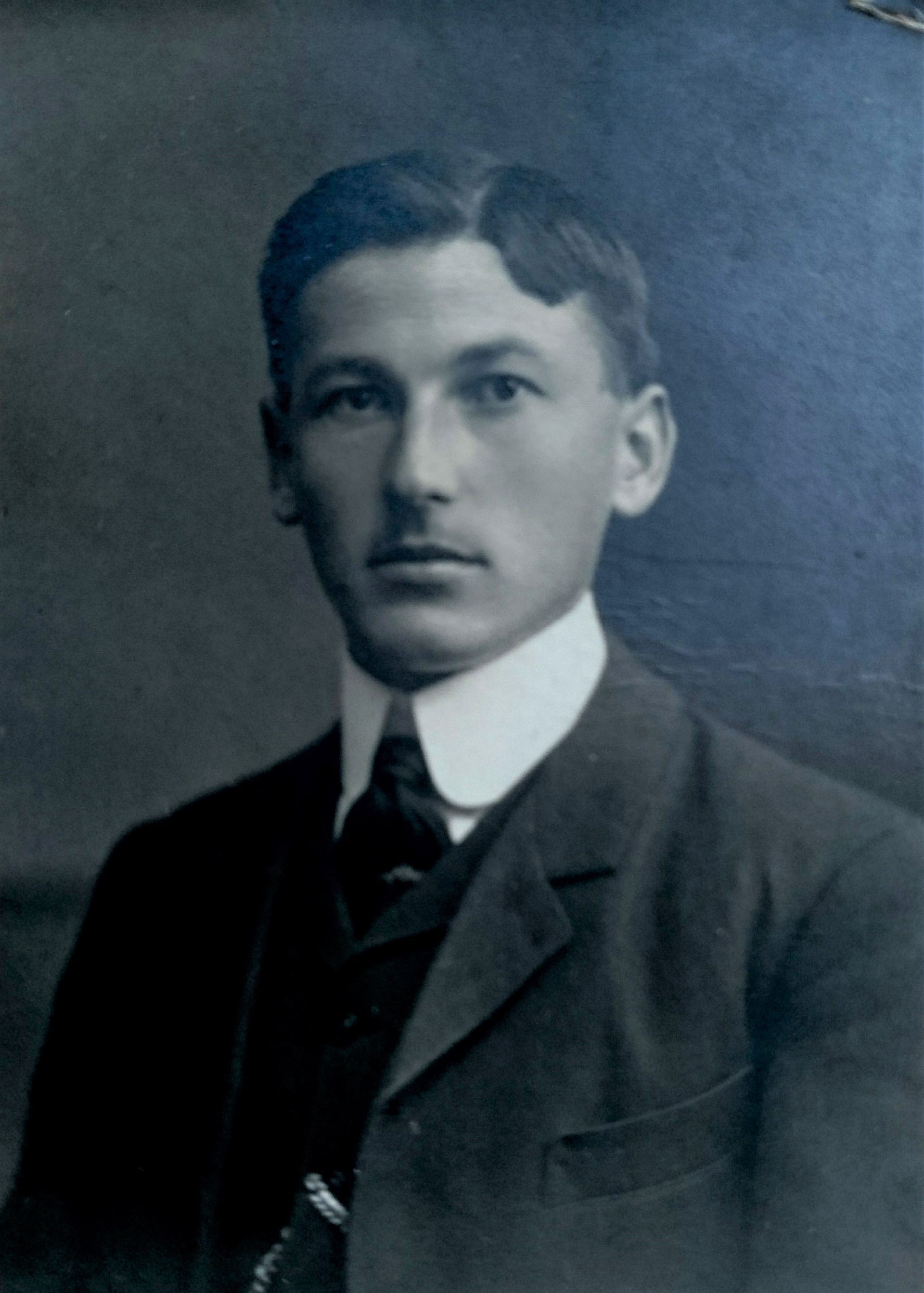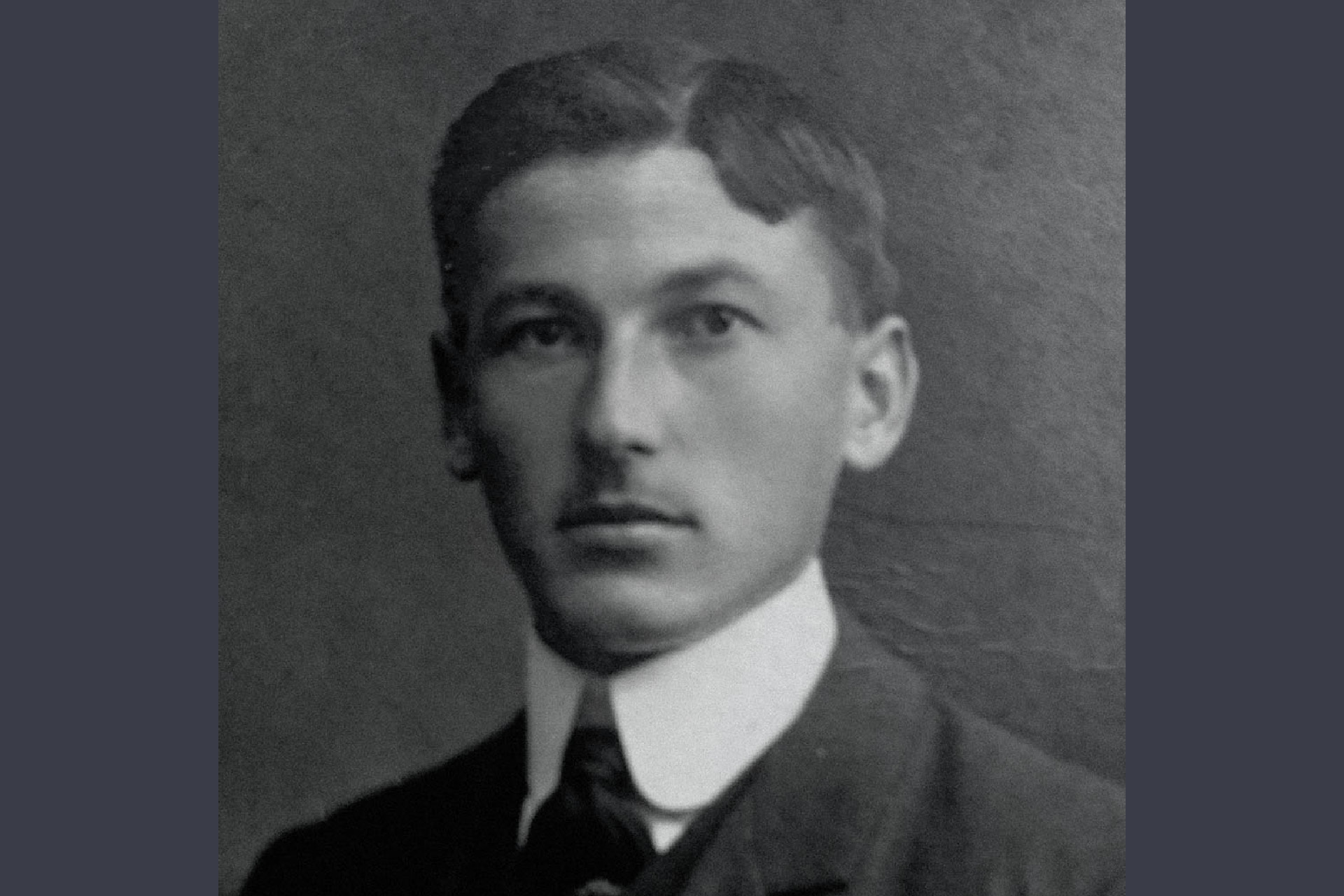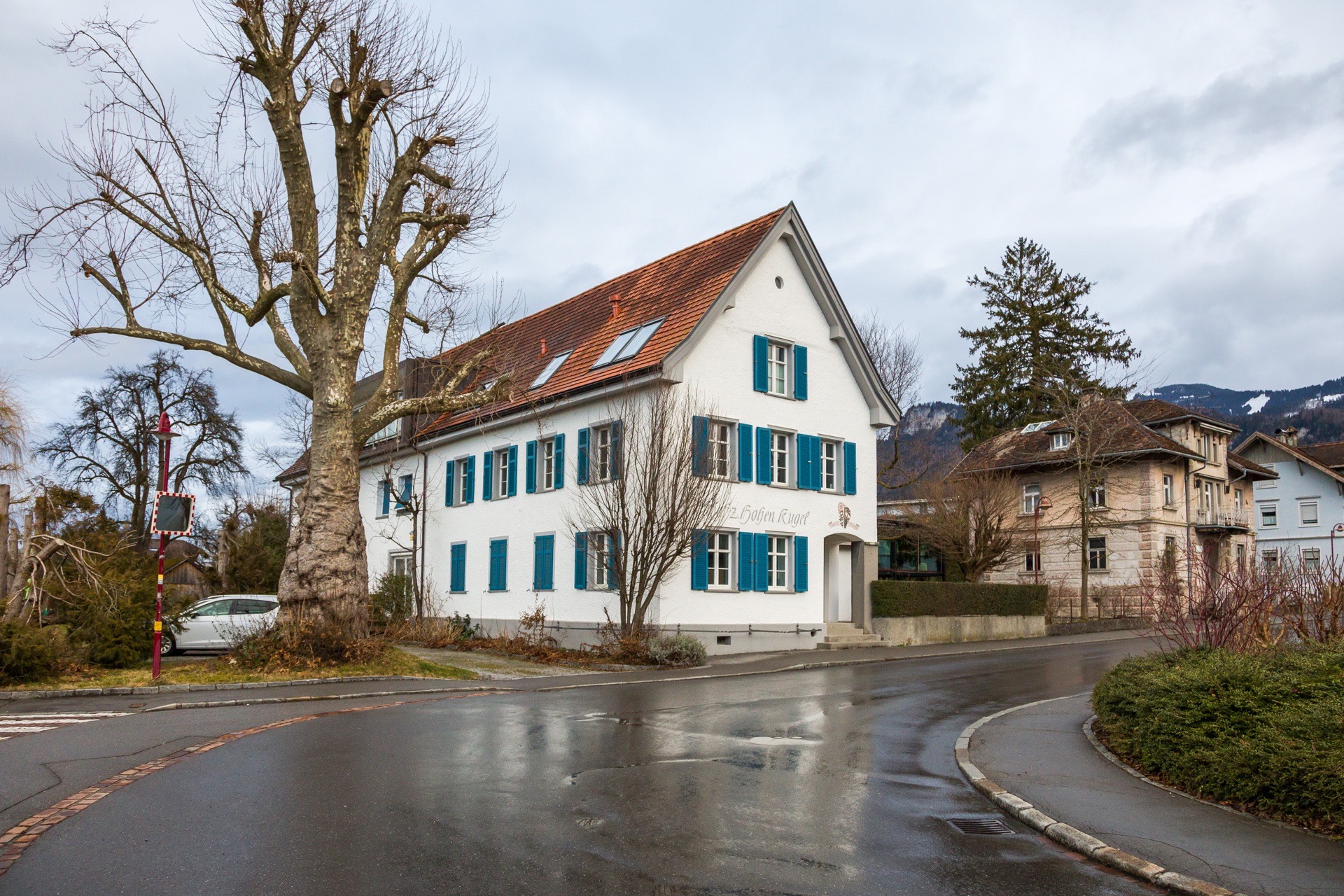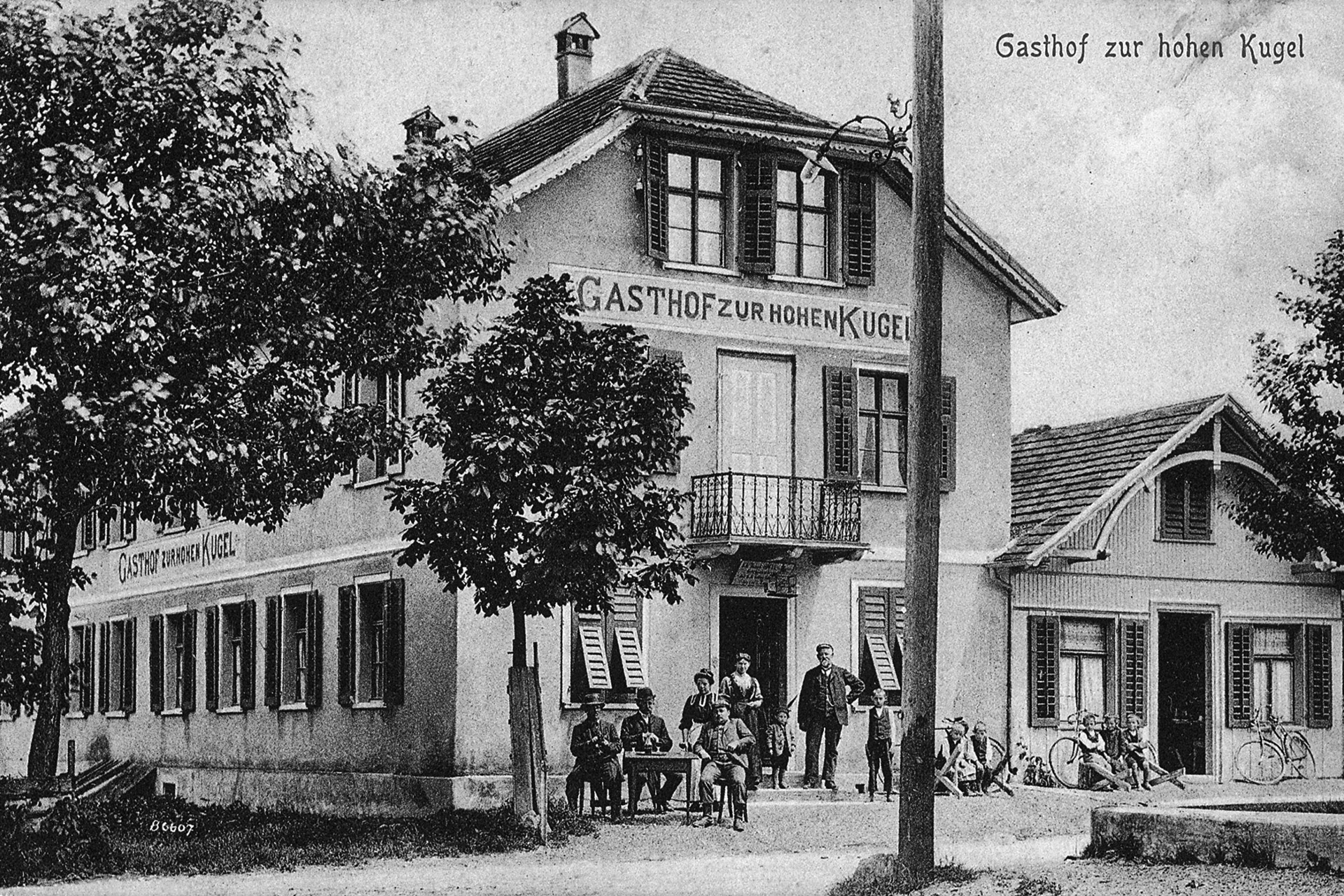Tobias Feurstein> May 31, 1944
31 Tobias Feurstein
Drowned in the Rhine? The mysterious death of the innkeeper and escape helper Tobias Feurstein
Götzis, May 31, 1944
”Drowning death in the Rhine. Tobias Feurstein, the innkeeper zur Hohen Kugel in Götzis, was to be arrested for anti-state statements and taken to the police prison in Bregenz at the disposal of the Gestapo in Bregenz. Immediately before his arrest, he fled and tried to swim across the Rhine to Switzerland, where he died of drowning. The body was recovered a few weeks later in the Harder Bay and buried in Götzis.”[1]
This entry in the chronicle of the Gendarmerie post Götzis, which was made retrospectively, may not contain the whole truth about the death of the innkeeper Tobias Feurstein. However, the mystery surrounding his death will probably never be solved.
Feurstein was one of the few committed communists in Vorarlberg. During the First World War, he survived front-line service until he became a Russian prisoner of war in Galicia on July 1, 1915. In the village of Penza, 550 kilometers south of Moscow, he was assigned a job as a cook and eventually experienced revolution and the terror of counter-revolution. He returned to his homeland with revolutionary enthusiasm without any confidence in the political forces that had driven Austria into war.
In 1926 he and his wife Alice, who was from Egg like himself, bought a burned-down inn in Götzis: “Zur Hohen Kugel”. Together they rebuild the ruins of the fire and refurbished the inn. In addition, he also works as a decorative painter. And they ran a modest farm.
From October 1936, Vorarlberg becomes the scene of numerous “illegal” border crossings. Thousands of Austrians, Poles, Romanians, Czechs and Hungarians cross the Rhine, through Switzerland and France to Spain to join the International Brigades – the volunteer army trying to defend the Spanish Republic against the fascist putsch of General Franco. According to a 1937 gendarmerie report, around 40 people are involved in organizing these border crossings. Among them are Tobias Feurstein and his son Armin.
Feurstein remains in the sights of the police. According to a report of the Feldkirch district court dated February 9, 1938, Feurstein believes “in the communist paradise in Russia” and listens “with preference to the communist secret radio station,” tells ”his guests about communist ideals in Russia,” and therefore had already been “reported to the local police station in 1934 and 1936 for communist speech.”[2]
At the beginning of 1938, Tobias and Armin Feurstein are charged “with unauthorized solicitation for war service in Spain on the Communist side”. Tobias Feurstein receives an arrest sentence of three months, his son of two weeks.
But soon Austria is annexed to the German Reich. Feurstein, released in the meantime, is one of the few citizens of Götzis who votes “no” in the subsequent referendum. Now it is Jews and political refugees who seek the way across the Rhine. And resistant people like Tobias Feurstein or the embroiderer Edmund Fleisch in Altach now become smugglers of human beings.
Feurstein's attitude to the new regime is no secret. In November 1942, he spends three weeks in Gestapo custody. His wife and children are also increasingly subjected to reprisals. His daughter Sinaida is harassed at her workplace in the Huber company by a fanatical National Socialist. Feurstein complains about this and earns new denunciations and a report.
On May 31, 1944, a gendarme from the Götzis post comes to his inn to arrest him. But Feurstein manages to run away. He changes into dark clothes, as his daughter remembers, disappears in time through the back door and escapes on a bicycle in the direction of Switzerland. Then his trail is lost.
On the same day, his daughters Sinaida and Irma inquire about their father's whereabouts at the gendarmerie post. They were told that he had drowned in the Rhine. At the police station, they see his wallet, his draft card, his clothes and his bicycle. But the body of the allegedly drowned father has disappeared. It is not until June 28 that they learn his body had been found in Hard on Lake Constance. During the night, the wooden coffin is carried into the house, but a Gestapo officer named Stock guards it and denies the family's wish to see their father again. “The coffin remains closed!” he gruffly notifies.
Feurstein, or perhaps just an empty coffin, is buried in the Götzis cemetery. After 1945, a Swiss customs officer tells that Tobias Feurstein was caught and taken away. When Alice Feurstein dies in 1962 and the grave is opened for her burial, no bones are found, according to oral testimonies. What is legend and what is reality will remain open.[3]
[2] Penal decision Tobias Feurstein, Götzis, communist activity; DÖW, Vienna, file numbers 19512/5, 19512/13; 19512/34, 19512/44.

Tobias Feuerstein
31 Tobias Feurstein
Drowned in the Rhine? The mysterious death of the innkeeper and escape helper Tobias Feurstein
Götzis, May 31, 1944
”Drowning death in the Rhine. Tobias Feurstein, the innkeeper zur Hohen Kugel in Götzis, was to be arrested for anti-state statements and taken to the police prison in Bregenz at the disposal of the Gestapo in Bregenz. Immediately before his arrest, he fled and tried to swim across the Rhine to Switzerland, where he died of drowning. The body was recovered a few weeks later in the Harder Bay and buried in Götzis.”[1]
This entry in the chronicle of the Gendarmerie post Götzis, which was made retrospectively, may not contain the whole truth about the death of the innkeeper Tobias Feurstein. However, the mystery surrounding his death will probably never be solved.
Feurstein was one of the few committed communists in Vorarlberg. During the First World War, he survived front-line service until he became a Russian prisoner of war in Galicia on July 1, 1915. In the village of Penza, 550 kilometers south of Moscow, he was assigned a job as a cook and eventually experienced revolution and the terror of counter-revolution. He returned to his homeland with revolutionary enthusiasm without any confidence in the political forces that had driven Austria into war.
In 1926 he and his wife Alice, who was from Egg like himself, bought a burned-down inn in Götzis: “Zur Hohen Kugel”. Together they rebuild the ruins of the fire and refurbished the inn. In addition, he also works as a decorative painter. And they ran a modest farm.
From October 1936, Vorarlberg becomes the scene of numerous “illegal” border crossings. Thousands of Austrians, Poles, Romanians, Czechs and Hungarians cross the Rhine, through Switzerland and France to Spain to join the International Brigades – the volunteer army trying to defend the Spanish Republic against the fascist putsch of General Franco. According to a 1937 gendarmerie report, around 40 people are involved in organizing these border crossings. Among them are Tobias Feurstein and his son Armin.
Feurstein remains in the sights of the police. According to a report of the Feldkirch district court dated February 9, 1938, Feurstein believes “in the communist paradise in Russia” and listens “with preference to the communist secret radio station,” tells ”his guests about communist ideals in Russia,” and therefore had already been “reported to the local police station in 1934 and 1936 for communist speech.”[2]
At the beginning of 1938, Tobias and Armin Feurstein are charged “with unauthorized solicitation for war service in Spain on the Communist side”. Tobias Feurstein receives an arrest sentence of three months, his son of two weeks.
But soon Austria is annexed to the German Reich. Feurstein, released in the meantime, is one of the few citizens of Götzis who votes “no” in the subsequent referendum. Now it is Jews and political refugees who seek the way across the Rhine. And resistant people like Tobias Feurstein or the embroiderer Edmund Fleisch in Altach now become smugglers of human beings.
Feurstein's attitude to the new regime is no secret. In November 1942, he spends three weeks in Gestapo custody. His wife and children are also increasingly subjected to reprisals. His daughter Sinaida is harassed at her workplace in the Huber company by a fanatical National Socialist. Feurstein complains about this and earns new denunciations and a report.
On May 31, 1944, a gendarme from the Götzis post comes to his inn to arrest him. But Feurstein manages to run away. He changes into dark clothes, as his daughter remembers, disappears in time through the back door and escapes on a bicycle in the direction of Switzerland. Then his trail is lost.
On the same day, his daughters Sinaida and Irma inquire about their father's whereabouts at the gendarmerie post. They were told that he had drowned in the Rhine. At the police station, they see his wallet, his draft card, his clothes and his bicycle. But the body of the allegedly drowned father has disappeared. It is not until June 28 that they learn his body had been found in Hard on Lake Constance. During the night, the wooden coffin is carried into the house, but a Gestapo officer named Stock guards it and denies the family's wish to see their father again. “The coffin remains closed!” he gruffly notifies.
Feurstein, or perhaps just an empty coffin, is buried in the Götzis cemetery. After 1945, a Swiss customs officer tells that Tobias Feurstein was caught and taken away. When Alice Feurstein dies in 1962 and the grave is opened for her burial, no bones are found, according to oral testimonies. What is legend and what is reality will remain open.[3]
[2] Penal decision Tobias Feurstein, Götzis, communist activity; DÖW, Vienna, file numbers 19512/5, 19512/13; 19512/34, 19512/44.





